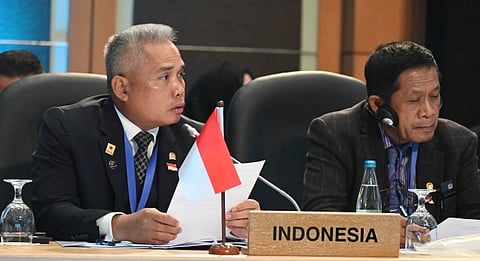
- NEWS
- the EDIT
- COMMENTARY
- BUSINESS
- LIFE
- SHOW
- ACTION
- GLOBAL GOALS
- SNAPS
- DYARYO TIRADA
- MORE

The Philippines and Indonesia's proposals regarding maritime security, dispute resolution and international law were met with rejection at the 31st Asia-Pacific Parliamentary Forum, sparking discussions on the complexities of regional cooperation.
Senator Ronald "Bato" dela Rosa, who chaired the APPF 31 working group on political and security matters, said China objected to the provisions that urged adherence to international laws through international bodies, such as the United Nations Convention on the Law of the Sea.
"We are espousing the adherence to international law through the international bodies, right? Sila naman, ang gusto nila (On their part, they want) to return to traditional ways of settling disputes. That is, an amicable settlement, talking bilaterally na walang pakialam yung mga ibang (without the interference of other) bodies like the United Nations," Dela Rosa said in an interview.
China, he said, had reservations about almost every paragraph.
"China opposed it. They had reservations on almost all the paragraphs," he said.
Citing the APPF rule where a resolution could only be adopted through consensus, Dela Rosa noted that China's objections resulted in the rejection of the Philippines' and Indonesia's drafted maritime resolutions.
"We have to follow the rules, but anyway, we still have a working group. If it's still intercepted or if it goes and the oppositor agrees to the revised draft resolution, then it still has a chance to be adopted," he said.
Dela Rosa said China is pushing for bilateral talks in settling maritime and security disputes.
China, a party state to UNCLOS, has rejected the arbitral ruling that said its claim of historic rights to resources in the South China Sea "had no basis in law and is without legal effect."
The Hague-based decision, constituted under UNCLOS, upheld the Philippines' sovereign rights and jurisdiction over its exclusive economic zone in the portion of SCS it calls the West Philippine Sea.
In a draft resolution on strengthening the capacity of parliaments to promote regional peace and stability, the Philippines urged the member-parliaments to "support continued adherence to and promotion of the 1982 Manila Declaration on the Peaceful Settlement of Disputes, which, among other things, encourages states to make full use of the provisions and procedures provided in Chapter VI of the Charter of the United Nations, and affirms that recourse to the judicial settlement of disputes should not be considered an unfriendly act between states."
The country's resolution also urged member parliaments to "support relevant states as they earnestly work toward the early conclusion of an effective and substantive Code of Conduct (CoC) consistent with international law, particularly the 1982 UNCLOS."
In its draft resolution on enhancing maritime security cooperation in the Asia-Pacific, Indonesia emphasized "the need of all APPF member-parliaments to encourage unwavering commitment from all Asia-Pacific countries to international laws, including adherence to UNCLOS, as well as a commitment to expedite negotiations for the South China Sea CoC to achieve a stable, safe and prosperous region.
Indonesia likewise called on the APPF member parliaments to continue promoting cooperation and constructive dialogue on maritime issues of common interest. It shared concerns, ranging from traditional to non-traditional issues in the Southeast Asia region in accordance with international law, including the 1982 UNCLOS and other relevant international maritime instruments and conventions.
No-show
Meanwhile, Senator Imee Marcos on Friday questioned the absence of delegates from the United States in the ongoing Asia-Pacific Parliamentary Forum in the Philippines.
"The APPF is sadly blighted by the absence of the US, surely the major Pacific power," Marcos said in a statement.
"Did we fail to invite the Americans in time? Was there some failure of coordination which ultimately led to their absence?" she asked. "Certainly, the Americans understand the importance of their participation in any meaningful dialogue for peace and security in this vast region."
Sought for comment, the US Embassy in Manila deferred to the US Congress why there were no delegates from the American legislative branch to the 31st APPF hosted by the Philippines.
The US, however, reiterated its commitment to maintaining peace and stability in the Indo-Pacific region.
"The United States is committed to an Indo-Pacific region that is free, open, connected, prosperous, resilient, and secure," the embassy said.
'Stirring up trouble'
Senators slammed China for accusing the country of stirring up trouble in the region by conducting joint maritime patrols with the United States in the West Philippine Sea.
Senator Francis Tolentino insisted on the Philippines' right to conduct maritime patrols in its waters.
"It's a right, the area is ours," Tolentino said in an interview, adding that the scheduled delivery of Christmas gifts to Filipino soldiers stationed at Ayungin Shoal should go on in whatever manner as long as it does not disrupt national security.
Tolentino referred to the private group Atin Ito's plan to deliver Christmas gifts to the troops safeguarding the country's sovereignty amid tensions in the WPS.
